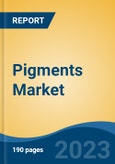Speak directly to the analyst to clarify any post sales queries you may have.
10% Free customizationThis report comes with 10% free customization, enabling you to add data that meets your specific business needs.
The burgeoning global population has fueled rapid urbanization in both developed and developing economies, such as the United States, China, India, and others. Consequently, increased governmental investment in the construction sector has materialized to facilitate various upcoming infrastructure projects. A report by the National Investment Promotion and Facilitation Agency highlights that infrastructure activities accounted for 13% of total foreign direct investment (FDI) inflows in 2021. Furthermore, the swift development of urban amenities such as water supply, sanitation, urban transport, schools, and healthcare is amplifying the growth of the construction industry. In this context, pigments play an instrumental role, particularly in paints and coatings used in construction. Not only do they provide color and aesthetic enhancement, but they also safeguard surfaces against weathering, UV radiation, and corrosion. Mixing pigments with binders and other additives yields robust coatings for walls, ceilings, facades, and structural components. Pigments are also incorporated into concrete and cement-based products to enhance appearance and provide color. These factors contribute to a heightened demand for pigments within the burgeoning building and construction sector.
Plastics, with their exceptional malleability, have established their indispensability across industries like packaging, automotive, construction, electronics, healthcare, and consumer goods. The versatility of plastics, capable of replacing traditional materials in many applications, is driving the sector's growth. Pigments are an integral part of the plastics industry, lending vibrant colors to products, and presenting a wide spectrum of options for manufacturers to create items in various shades. Pigments are vital for coloration, branding, UV resistance, concealing properties, product identification, safety, and visual effects. By augmenting the appearance, performance, and marketability of plastic products, pigments are becoming a value-adding component of the industry.
Key Market Drivers
1. Growing Demand for Pigments in the Construction Industry: Pigments play a pivotal role in construction by providing a range of colors for materials like concrete, paints, coatings, and tiles. This allows architects and builders to explore diverse color palettes and translate their creative visions into reality. Beyond aesthetics, pigments contribute to the functionality and durability of construction materials, enhancing resistance to environmental factors and wear.2. Increasing Demand for Pigments in the Packaging Industry: As consumer preferences evolve, the packaging industry is embracing innovative and captivating designs. Pigments are essential in creating visually appealing and distinctive packaging that resonates with consumers and enhances brand recognition.
3. Growing Demand for Pigments in the Paints and Coatings Industry: The paints and coatings industry is a significant driver of the pigments market, fueled by urbanization, infrastructure development, and the demand for durable and sustainable colors.
Key Market Challenges
1. Raw Material Availability and Price Fluctuations: The pigments industry relies on a diverse range of raw materials, which can be limited in availability. Price fluctuations in these raw materials due to geopolitical factors and market dynamics can disrupt manufacturers' cost structures and long-term planning.Key Market Trends
1. Digital Printing and Pigment Innovation: The rise of digital printing technologies has driven the need for pigments that are compatible with inkjet and UV-curable inks. Pigment manufacturers are investing in R&D to create innovative pigments that meet the demands of digital printing applications.Segmental Insights
1. Application Insights: The paints and coatings segment dominated the Pigments market in 2022 and is expected to continue expanding. The demand for paints and coatings is intricately linked to construction, driven by global urbanization and infrastructure development.2. Type Insights: The Organic segment led the Pigments market in 2022 and is predicted to continue growing. Organic pigments find extensive use in printing ink applications and food packaging due to their regulatory compliance.
Regional Insights
The Asia Pacific region has emerged as the leader in the Global Pigments Market, driven by rapid industrialization and infrastructure development in countries like China, India, and Southeast Asian nations. Additionally, the growing packaging industry and consumer demand for vibrant and appealing colors in packaged goods contribute to the increasing demand for pigments in the region.Key Market Players
- BASF SE
- Huntsman International LLC
- LANXESS AG
- Clariant International Ltd.
- Merck KGaA
- Kronos Worldwide, Inc.
- Cabot Corporation
- Tata Pigments Ltd.
- The Shepherd Color Company
- DIC Corporation
Report Scope:
In this report, the Global Pigments Market has been segmented into the following categories, in addition to the industry trends which have also been detailed below:Pigments Market, By Type:
- Inorganic
- Organic
- Specialty
Pigments Market, By Application:
- Paints and Coatings
- Plastics
- Printing Inks
- Construction
- Others
Pigments Market, By Region:
- Asia Pacific
- North America
- Europe
- Middle East & Africa
- South America
Competitive Landscape
Company Profiles: Detailed analysis of the major companies present in the Global Pigments Market.Available Customizations:
Global Pigments Market report with the given market data, the publisher offers customizations according to a company's specific needs.This product will be delivered within 1-3 business days.
Table of Contents
Companies Mentioned
- BASF SE
- Huntsman International LLC
- LANXESS AG
- Clariant International Ltd.
- Merck KGaA
- Kronos Worldwide, Inc.
- Cabot Corporation
- Tata Pigments Ltd.
- The Shepherd Color Company
- DIC Corporation
Table Information
| Report Attribute | Details |
|---|---|
| No. of Pages | 190 |
| Published | October 2023 |
| Forecast Period | 2022 - 2028 |
| Estimated Market Value ( USD | $ 25.7 Billion |
| Forecasted Market Value ( USD | $ 32.73 Billion |
| Compound Annual Growth Rate | 4.2% |
| Regions Covered | Global |
| No. of Companies Mentioned | 10 |








